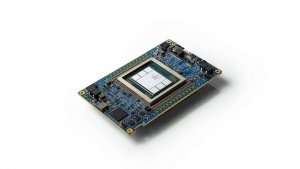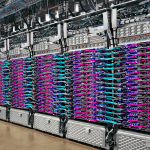
- The new lineup will include updated AI chips, fresh versions of Intel’s Xeon processors and semiconductors that help connect telecommunications networks.
- The new products are designed to bolster Intel’s position outside of CPUs and push deeper into AI.
For years, Intel Corp. has been reworking its artificial intelligence (AI) strategy as it tries to take on Nvidia Corp.— the leader in the market for chips designed to excel at AI computations. In fact, under new chief executive Pat Gelsinger, Intel has increased its offerings and introduced new AI software for its expanding lineup of chips to improve AI-driven softwares and services.
To be fair, eyeing the market share of Nvidia has been a challenge for Intel as many AI researchers and companies are accustomed to using the former’s software platform CUDA. But Intel still made its move by introducing a new lineup that includes updated AI chips, fresh versions of Intel’s Xeon processors and semiconductors that help connect telecommunications networks.
Announcing the new products at an event in Dallas on Tuesday, the tech giant also said that for the first time, it will sell graphics chips designed for data centers, a move seen to be a challenge to Nvidia. For context, Intel is known mainly for its dominance in the market for central processing units (CPUs), the brains behind personal computers and the servers that run corporate networks and the internet.
However, as Nvidia began gobbling up the market for AI-centric chips, Intel were gradually losing its shine amongst investors. Today, Nvidia accounts for about 80% of revenue from AI-specific computation in big data centers, according to Informa PLC’s Omdia, a British research and consulting firm.
Being dominant in AI-specific chips has also helped Nvidia surpass Intel as the most valuable chip company in the US by market capitalization two years ago. That said, the new products are designed to bolster Intel’s position outside of CPUs — its core strength — and push deeper into AI.
AI, data center chips by Intel
Basically, Intel’s Habana AI unit released a new version of Gaudi training chips — Gaudi2. According to Intel, the Gaudi2 is twice as fast as Habana’s previous AI chip and manufactured at Taiwan Semiconductor Manufacturing Co’s 7-nanometer transistor technology from 16-nanometers previously.
As it is commonly known, the smaller the transistor size, the faster and more powerful the chip is. Intel even claims that Gaudi 2 offers up to three times as much throughput as Habana Labs’ first-generation AI training chip. In an internal benchmark test, the chip delivered twice as much throughput as Nvidia’s flagship A100 graphics processing unit for data centers. The benchmark test measured how fast the Gaudi 2 and A100 can train two popular machine learning models.

Intel announced that Habana Labs, its data center team focused on AI deep learning processor technologies, launched its second-generation deep learning processors for training and inference: Habana® Gaudi®2 and Habana® Greco™.
Habana Labs Chief Operating Officer Eitan Medina also emphasized that “Compared with the A100 GPU, implemented in the same process node and roughly the same die size, Gaudi 2 delivers clear leadership training performance as demonstrated with apples-to-apples comparison on key workloads. This deep-learning acceleration architecture is fundamentally more efficient and backed with a strong roadmap.”
The US tech giant also launched Greco, Habana Lab’s second-generation inference chip taking an AI algorithm and making a prediction or identifying an object. Like the Gaudi 2, the Greco has been upgraded from a 16-nanometer manufacturing process to a seven-nanometer process.
Intel also announced plans to add several new IPUs to its portfolio through 2026. IPUs are a line of specialized chips the company introduced last year that can offload chores such as encrypting data from a server’s CPU to free up processing capacity. On top of that, the company shared details about the Arctic Sound-M graphics card, another upcoming edition to its data center portfolio. The GPU is designed for use cases such as video content processing and cloud-based game streaming.
Intel’s data center and AI lead Sandra Rivera shared that the AI chip market is estimated to grow some 25% a year in the next five years to reach around US$50 billion. “We intend to invest and innovate to lead this market,” she said, adding that increasingly the investments will be in software, both for expanding Intel’s team and buying other companies,” Sandra said.










